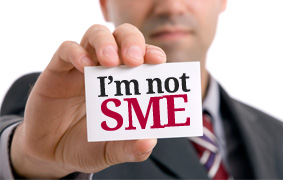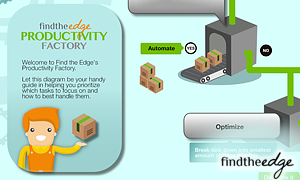 While governments and big blue chip executives may think they're reaching out to, marketing to, and selling to smaller businesses successfully – if they're using the blanket term SME, they're not.
While governments and big blue chip executives may think they're reaching out to, marketing to, and selling to smaller businesses successfully – if they're using the blanket term SME, they're not.
The simple fact is they have no idea how they should talk to owner-managed businesses. They fail to recognise that small businesses operate in an entirely different world to their own, and speak a completely different language.
The UK is home to 4 million small businesses. That's just accounting for the bosses, who are responsible for 99.8% of all UK business names, and who employ 12 million people.
Every single piece of qualitative research I've ever conducted has shown that business leaders who fall into the broad definition of an ‘SME', feel that they are usually patronised and sold to in an insulting way by larger companies.
Small businesses are simply incompatible with larger businesses – they make purchasing decisions in completely different ways.
Most smaller businesses are smaller because they have chosen to be. Corporates commonly assume that small businesses are basically scaled down versions of big businesses.
This is wrong. Frogs are different to small crocodiles!
The vast majority of large and small businesses have a completely different mind-set.
That's why most adverts aimed at small businesses fall down (IT, HR services, software and banks). They make the mistake of failing to create a real relationship, or display the values that are important to small businesses.
Because of this, most of the adverts that are clumsily aimed at small businesses are fairly ineffective. The ad agencies behind them completely fail to get to grips with the wants and needs of their audience.
Research has shown that 76% of people believe large businesses lie when they're advertising. 78% of people say they will be more likely to buy on a recommendation from someone else. Despite these figures, corporates still believe the best route to market is through advertising spend.
Anyone who wants to be able to sell or talk to small businesses effectively, needs to understand that:
- Small businesses should be treated differently during the multiple different stages of their life cycle
- The transition between a stage – e.g. moving from start-up to growing – always represents a good time to initiate communication
- Being smug, insincere or patronising is not the way to get sales
- Small businesses are usually willing to pay more for a brand if it recognises their lifestyle, accepts it, and treats them with respect.
Here's a few of my thoughts that I would like to forward to any big corporates who suddenly decide they want to wade into the small business community:
- It may be easier for you to lump businesses together as SMEs, but I'm no ‘SME'. What I am, is a small, or independent, or self-employed, or growing, or new, or owner managed, or young business. Whenever I attend a party, I don't introduce myself by saying “Hi there, I'm an SME.” Also, don't get me started with the word “Smee”…
- I cannot be crammed in with the 4 million other diverse and vibrant small businesses in the UK
- Just because my company is small, it does not mean I am an underdeveloped large business
- I should not be viewed as a second-class citizen, ripe for exploitation once you've finished with the blue chips
- If you're going to sell to me, please do it with a completely fresh approach, don't simply scale down the same methods you've used for the big corporates
- Don't patronise me
- I understand that you don't care. If you talked to other people in the same way most corporates speak to small business people, you'd most likely receive a bloody nose
- Don't treat me as a target, or simply as a means to reaching your end of year sales goal
- My buying cycle is quicker and less formal than it is for corporates, so please make faster systems that can match the way I purchase – not the other way round. I don't care about your processes – only you benefit from them
- I want every one of my suppliers to fully understand my business, business in general, and me
- I want quick action
- Make it clear what I will be paying for and how I will be paying for it
- Don't try to bamboozle me with science. Remember to ‘KISS – keep it simple stupid'
- Never forget that I am the customer
- Please don’t waste my time
- I don't actually have to buy from you now, or ever – remember this. If you gain my trust, and make it easy for me to buy from you, I'm far more likely to do so
- Please try to ensure your service exceeds my expectations. Make sure you explain how you can help me, and show me all of the benefits you can provide
- Please customise the products or service you offer to make them specifically applicable to my business
- Don't be a numbers jockey, instead focus on becoming a trusted adviser
To sum up
- There is a big difference between a small business and a big business
- The vast majority of large businesses are completely clueless when it comes to small businesses
- Most ‘stuff' is not created with small businesses in mind or communicated to them in an appealing manner
- To be quite honest, most of the stuff aimed at small businesses is pretty patronising





